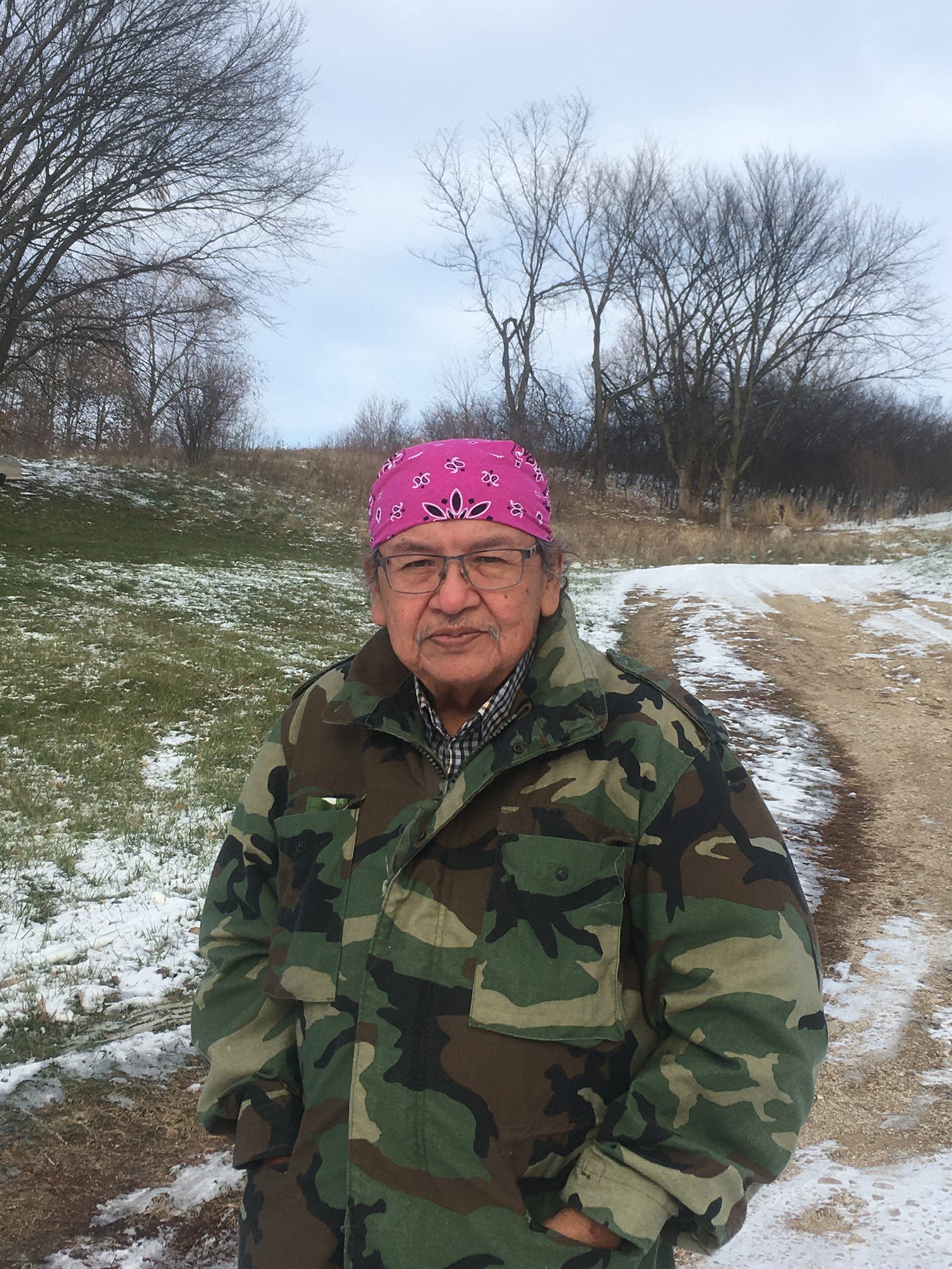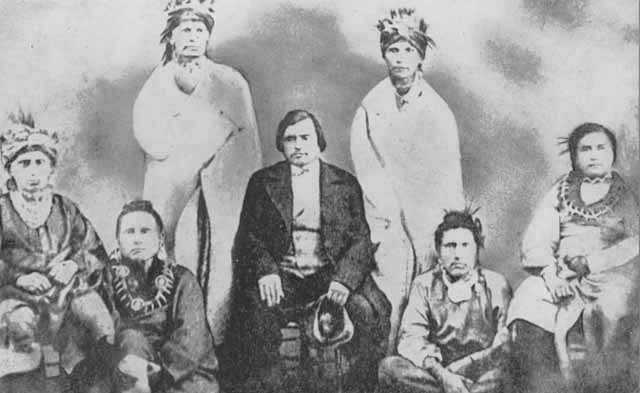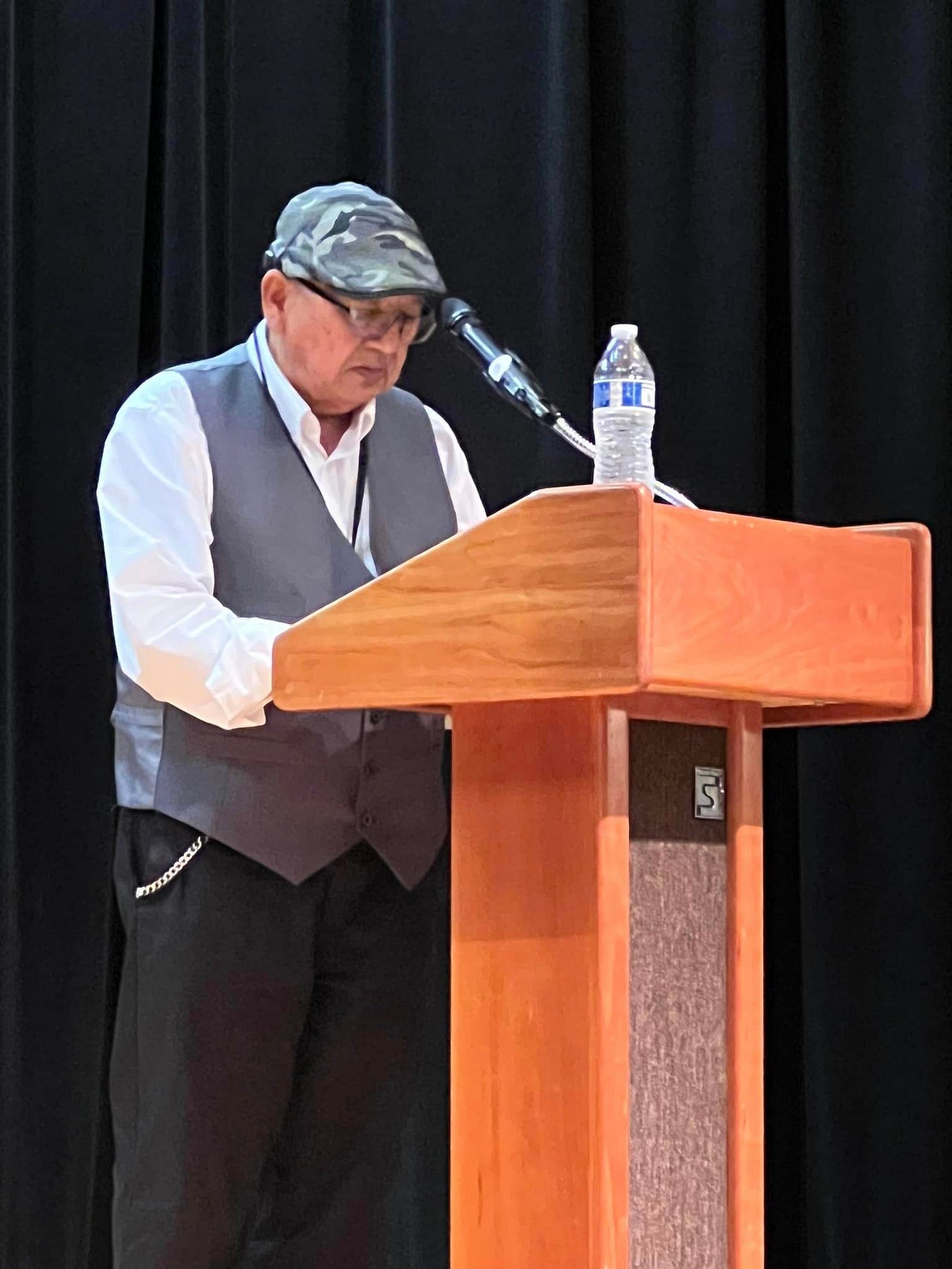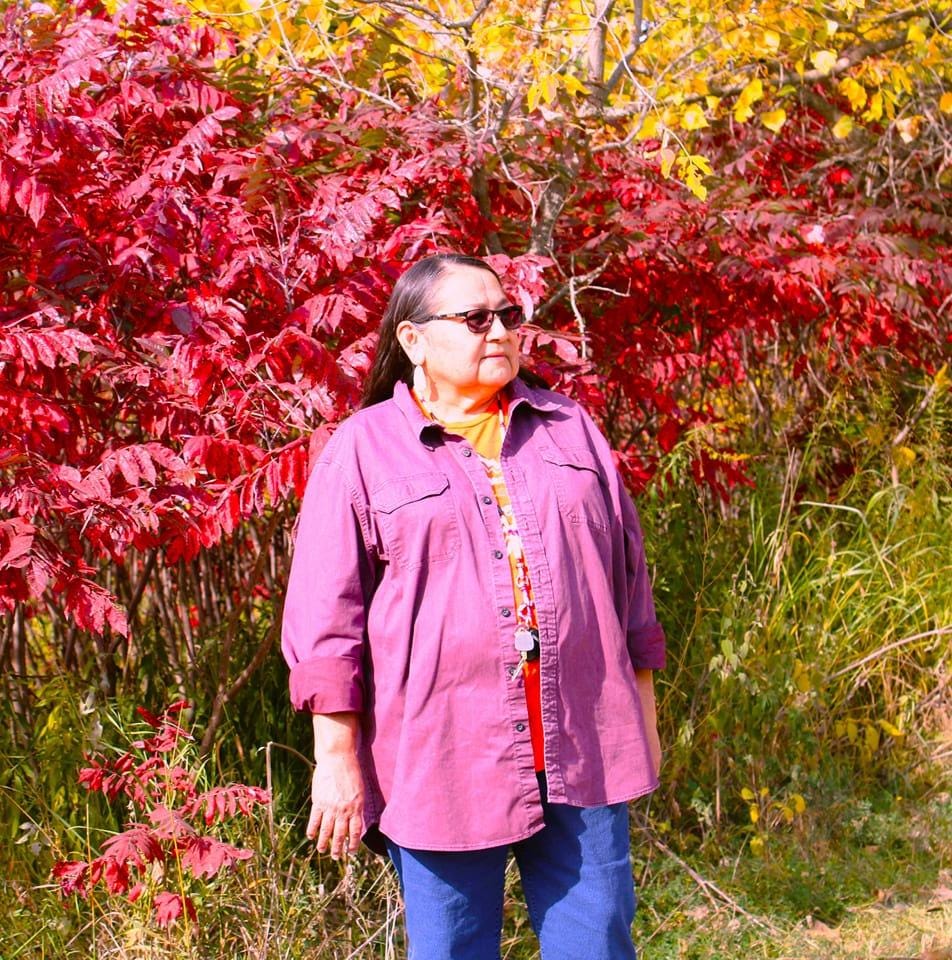A portrait of the artist as a young Meskwaki
Poet Ray Young Bear talks about his upbringing and how he fell in love with poetry

MESKWAKI SETTLEMENT, TAMA COUNTY -- No one is going to cancel Ray Young Bear's culture.
Not as long as he has air in his lungs and paper or a keyboard to write on.
He's a man of letters and a man of the soil. More correctly, a man of the earth -- the Red Earth of the Meskwaki people.
They called themselves Meshkwakihaki, which means "red earth" in the Meskwaki language. According to their creation story, people were created out of red earth.
Young Bear is firmly grounded in that culture, but he also excels writing poetry in his second language, English. He's been writing since high school and is a published, award-winning poet and teacher. He says the whole of his experience culture and upbringing flow into his creative process.
The Meskwaki reside on a settlement, not a reservation. They own their land. After the tribe was displaced multiple times by war and American European colonization, in 1851, the Iowa Legislature passed a bill allowing the tribe to purchase land and live in the state. The purchase was completed in 1857 by Young Bear's ancestor, Maminwanike. Young Bear believes there was a "commonality" at that time between indigenous people and the white settlers from having endured the same hardships of winter and other challenges to make a life in the area.
The settlement has grown from an original 80 acres south of U.S. Highway 30 to more land on both sides of the highway following the opening of Meskwaki Casino in 1992.
Young Bear just turned 73. He was born Nov. 12, 1950, at the hospital in Marshalltown. "I grew up and spent most of my life here, except for the two or three years I went to college," he said, one of four children. He went tribal day school before attending various schools in the South Tama public school system. He graduated from South Tama High School in 1969.

"My first publication in poetry was in 11th grade in 1968," he said. "That was a starting point and a pivotal point -- an aspiring writer. It was a little newsprint magazine called ‘Idea Exchange.'”
It was published by the national Upward Bound program. That program was launched as a result of President Lyndon Johnson's "War on Poverty" Economic Opportunity Act of 1964. The goal of Upward Bound was, and is, to offer opportunities to attend college for children of low income, in rural areas and those whose families had no previous members attend college. He studied summers at Luther College with rural white farm kids and Black students from Waterloo.
"South Tama also recognized that I had been published. What they did was, to me, extraordinary,” Young Bear said. “They took the poem and displayed it in the hallway. That was a first step in recognizing that Native Americans were capable of expressing themselves, even if it was in a language not their own.
"That was, to me, a nice starting point, when you think about 1968," Young Bear said. Opportunities for racial and ethnic minorities were still slim. "That was also the same year I asked a photography teacher to be considered for photography class."
The teacher turned him down, ostensibly for lack of experience.
"It turned out to be just a rejection of being a Native American,” Young Bear said, “because I had shown him photographs I had taken, of the moon, the gnarly limbs of an oak tree above my parents' home. That was a letdown."
But he happened into poetry years earlier, and almost unawares.
"In seventh grade was my first essay -- or so I thought. The English teacher said, 'Ray Young Bear, do you know what you have written?' I said, 'No.' And she said, 'You have written a poem.' I thought 'What the hell is a poem?' I thought I was aware of what she wanted."
He had written about a walk from his grandmother's to his parents’ home along the Iowa River.
"I'd seen a fish jump or something --- something tranquil and Iowa-esque,” he said. But it had pacing and rhythm like poetry. “I had a vague idea it was part of the lullaby system I had heard in elementary school, and possibly related to a long poem -- I think it was Lochinvar the knight," the hero of the Scottish ballad "Marimon" by Sir Walter Scott.
"Thereafter I began wondering more about poetry. I fell in love in eighth grade with a song by Simon and Garfunkel, 'The Sound of Silence.'" He wrote down the lyrics and carried them in his billfold for a couple of years. "I was fascinated with lyrics. And the lyrics of musicians appealed to me."
Older cousins also passed on song lyrics printed in rock 'n' roll and tribal magazines.
"I got fascinated by the whole process of what my mind was capable of doing, and seeing that some of that stuff could actually be seen on paper in a proper form," in print media.
Then he entered Upward Bound, and his poetry caught the eye of one of the directors. "They asked if they could publish that," he said. "Once I saw my poem in print, that was the hook that got me.
“I thought 'Wow! Never mind the smelly ink! These are my words down here!' he said with a chuckle.
"The exhilaration I felt then, as a young man, as a teenager, is the same exhilaration I feel today when an acceptance or when I see my work published," he said. "That's the hook. That was my entry to literature. It wasn't, 'Hey Ray Young Bear, become a writer and you'll become rich and famous.' It wasn't that at all. That was beyond my comprehension in high school. My interest was just the exhilaration of seeing (poetry in) print.
"People ask me, 'Do you make much money from poety?' No I don't,” he said. ”But from day one, that was not my intent.” And, he said, “It wasn't geared by my parents reading Shakespeare to me by the fireplace. It was a wood stove, and a kerosene lamp, and my grandmother recited winter stories, Meskwaki stories, mythology -- stories about the earth and how the belief system came to be.
"And so, when the winter nights came, and we would blow out the kerosene lamp for the last time, my grandmother would start sharing these winter stories,” he said. “The only time you could share those winter stories was in the winter.
“She said, 'When the first snow comes, grandsons, that is our Creator. He's coming back to check on us to make sure that our songs and our prayers and our rituals and our ceremonies remain as they were when they were first given to us by the Creator in time immemorial.’ “ Young Bear related. “That, to me, was my first visualization of mythology -- five, six, seven years of age."
Watch a video of Ray Young Bear's poem "Grandmother" here.
His grandmother took in and fostered several children who'd been displaced due to family issues. One, a cousin, Leo Dean Peters, brought with him the first television set into the home. "My grandmother had just been hooked up to electricity the summer before. Lo and behold, I didn't know what I was looking at. That was my introduction to TV, civilization." His uncles had radio. That also was an influence.
Young Bear is steeped in the history of the region, even the geology, which is part of the Meskwaki religion. The stone that made up the Iowa Capitol is the same kind of stone that Meskwaki prayed to.
"This whole place captivates me -- the history, the geology," he said "Trying to hammer out a story from that, using the English language, has been one hell of a journey. It's been joyous; it's been depressing. Number one, English isn't your language. So you have to train yourself in grammar, diction, punctuation. I despised English in high school."
The educational system at that time, "the pedagogic system, was relatively new in dealing with minorities." including the Meskwaki.
And there were everyday cultural adjustments in day-to-day school life — for example at lunch in public school, when served chocolate pudding for the first time, Young Bear and his siblings thought it was mud.
Taking into account how he and the settlement he calls home have progressed from his childhood, Young Bear said, "It's a long time coming, to be in this, compared to what I grew up in, in a two-room home."
Young Bear has published five collections of poetry, and his work has appeared in numerous literary magazines and anthologies. He holds an honorary doctorate from Luther College in Decorah.
He counts among his mentors Harvard-educated Minnesota poet and University of Iowa Writers Workshop alum Robert Bly, who passed away in 2021.
"Robert Bly was probably the best mentor anyone could have ever had," Young Bear said. He met him at a writers workshop in Bemidji, Minn., when Young Bear was 18.
"He said, 'Young Bear, this is really beautiful work. But I want to show you how to edit.'" He took out non-essential words. "He said 'What do you think, Ray' I said 'I like it!' He said, 'This is editing, Ray.'" Bly taught him to self edit. Bly, a 1968 National Book Award winner, also introduced Young Bear's work to publishers.
"Robert Bly paved the way for me," Young Bear said.
Preserving Meskwaki culture is important to Young Bear. He and his wife of 50 years, Stella, have tried to impart that onto their children, in the settlement and beyond; they and family have belonged to a drum group to preserve and educate tribal members and the world at large.
He's also been a bit of a gadfly where tribal government is concerned for many years, publishing a newspaper on settlement grounds.
He hopes those in broader society who do read his work have an appreciation of tribal culture.
“I have my language. I live in my grandfather's homeland. And my goal is to share my language,” he said. “My people often say you have to return a gift to the tribe. My gift is my work -- not so much the poetry in English I did for 50 years; I'm doing the opposite now. I'm composing Meskwaki song. I just needed grounding to do the things I'm doing now."
As an artist, "I have a good sense of underestimation to keep me on edge," he said. "I like where I'm at. Other poets, other writers that I know, are on the bestseller lists and so forth, and they're enjoying themselves. The only reward of significance I have over them is, I may not have as much money as them, but I am culturally intact."
Pat Kinney is a freelance writer and former longtime news staffer with the Waterloo-Cedar Falls Courier and, prior to that, several years at the Ames Tribune. He is currently an oral historian with the Grout Museum District in Waterloo. His “View from the Cedar Valley” column is part of “Iowa Writers Collaborative,” a collection of news and opinion writers from around the state who previously and currently work with a host of Iowa newspapers, news organizations and other publications. Click on their links below to sample their work.
The Iowa Writers’ Collaborative
From our founder, Julie Gammack:
”Have you explored the variety of writers in the Iowa Writer’s Collaborative? They are from around the state and contribute commentary and feature stories of interest to those who care about Iowa. Please pick five you’d like to support by becoming paid. It helps keep them going.’
Columnists
· Nicole Baart: This Stays Here, Sioux Center
· Laura Belin: Iowa Politics with Laura Belin, Windsor Heights
· Doug Burns: The Iowa Mercury, Carroll
· Dave Busiek: Dave Busiek on Media, Des Moines
· Iowa Writers’ Collaborative, Roundup
· Steph Copley: It Was Never a Dress, Johnston
· Art Cullen: Art Cullen’s Notebook, Storm Lake
· Suzanna de Baca: Dispatches from the Heartland, Huxley
· Debra Engle: A Whole New World, Madison County
· Arnold Garson: Second Thoughts, Okoboji and Sioux Falls
· Julie Gammack: Julie Gammack’s Iowa Potluck, Des Moines and Okoboji
· Joe Geha: Fern and Joe, Ames
· Jody Gifford: Benign Inspiration, West Des Moines
· Rob Gray: Rob Gray’s Area, Ankeny
· Nik Heftman: The Seven Times, Los Angeles and Iowa
· Beth Hoffman: In the Dirt, Lovilla
· Dana James: New Black Iowa, Des Moines
· Pat Kinney: View from Cedar Valley, Waterloo
· Fern Kupfer: Fern and Joe, Ames
· Robert Leonard: Deep Midwest: Politics and Culture, Bussey
· Letters from Iowans, Iowa
· Darcy Maulsby, Keepin’ It Rural, Calhoun County
· Tar Macias: Hola Iowa, Iowa
· Alison McGaughey, The Inquisitive Quad Citizen, Quad Cities
· Kurt Meyer: Showing Up, St. Ansgar
· Wini Moranville: Wini’s Food Stories, Des Moines
· Jeff Morrison: Between Two Rivers, Cedar Rapids
· Kyle Munson: Kyle Munson’s Main Street, Des Moines
· Jane Nguyen: The Asian Iowan, West Des Moines
· John Naughton: My Life, in Color, Des Moines
· Chuck Offenburger: Iowa Boy Chuck Offenburger, Jefferson and Des Moines
· Barry Piatt: Piatt on Politics Behind the Curtain, Washington, D.C.
· Dave Price: Dave Price’s Perspective, Des Moines
· Macey Spensley: The Midwest Creative, Norwalk
· Larry Stone: Listening to the Land, Elkader
· Mary Swander: Mary Swander’s Buggy Land, Kalona
· Mary Swander: Mary Swander’s Emerging Voices, Kalona
· Cheryl Tevis: Unfinished Business, Boone County
· Ed Tibbetts: Along the Mississippi, Davenport
· Teresa Zilk: Talking Good, Des Moines
The Iowa Writers Collaborative is also proud to ally with Iowa Capital Dispatch







I enjoyed this, Pat. I was aware of Ray Young Bear, but this fills in the blanks.